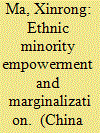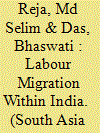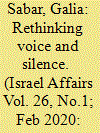|
|
|
Sort Order |
|
|
|
Items / Page
|
|
|
|
|
|
|
| Srl | Item |
| 1 |
ID:
133106


|
|
|
|
|
| Publication |
2014.
|
| Summary/Abstract |
The last two decades of economic decline in Africa have drawn attention to the crisis of masculinities, to "failed men" unable to build kinship networks and to "violent men" who damage social networks whilst competing for scarce resources. This article argues that a fragmented, neo-liberal society also produces new patterns of patriarchal aggrandisement. Focusing on Johannesburg's minibus-taxi industry, it shows how large informal sector activities are structured through kinship networks that in turn give rise to modes of masculinity seeking to control these networks. Johannesburg's minibus-taxi business is dominated by retrenched labour migrants, who moved into the transportation sector in the 1980s and 1990s at a time of industrial decline. It thus offers a case study of the changing patterns of accumulation and household formation in a social landscape where kinship ties continue to constitute the key relationships of obligation and support. Drawing on three-dozen core interviews with Zulu-speaking taxi owners and transporters, this article demonstrates that the taxi owner and the taxi boss are men to be emulated, but that the relationships between "big men" and "failed" or "violent" men are uncomfortably close.
|
|
|
|
|
|
|
|
|
|
|
|
|
|
|
|
| 2 |
ID:
167385


|
|
|
|
|
| Summary/Abstract |
While there is an emerging body of literature that examines labour resistance within industrial cities in China, there is, however, little research on ethnic minority labour migrants, in particular their interaction with the local state in migrant-receiving cities. This study fills this research gap by focusing on ethnic Yi labour migrants in the Pearl River Delta area. Based on seven and a half months of fieldwork, this article illustrates the ways in which local governments cope with Yi labour disputes on the one hand, and the strategies that Yi migrants developed – emphasizing their minority status while negotiating their labour rights – on the other. The article finds that a strategy to maintain stability by applying patronage selectively to certain ethnic groups cultivates ethnic elites as middlemen to appease workers’ collective disputes in the short term. However, the state’s failure to fully recognize cultural differences of ethnic minorities and to protect their labour rights results in more resistance and marginalization of ethnic minority labourers in the long term. In this way, the Chinese government’s current policy may jeopardize the wider aim of maintaining social order.
|
|
|
|
|
|
|
|
|
|
|
|
|
|
|
|
| 3 |
ID:
166880


|
|
|
|
|
| Summary/Abstract |
Large-scale interstate labour migration within India is facilitated by the freedom of movement for citizens within this huge nation state. However, such internal labour migration within India remains largely unstudied and offers huge scope for gaining significant new knowledge. Focusing particularly on migrant construction workers from West Bengal moving to Kerala, this article specifically examines the motivations of these migrants and the role of social networks in the development of such migration streams. A field survey in Kerala indicates that Kerala’s Gulf connection and rapid demographic transition have resulted in significant reduction of local supplies of labour, thus attracting more migrants from other states in India due to better job opportunities, higher wages and good payment systems. Networks within migrant groups, especially friends’ contacts, are found to be the strongest factor in supporting this migration process.
|
|
|
|
|
|
|
|
|
|
|
|
|
|
|
|
| 4 |
ID:
174035


|
|
|
|
|
| Summary/Abstract |
Israeli society is complex, multifaceted, heterogeneous, pluralistic, hectic and loud. Yet, as this volume claims, within this cacophonic arena, islands of silence and pockets of voicelessness remain. Obviously, not all of these could be addressed in this volume, leaving some unexplored: the voices of those suffering from terminal illness, of elders subjected to ageism, of the fat and the disabled, of the LGBT community and of non-Jewish migrants in Israel, to mention but a few that are not commonly heard. This article offers some insights into these unrevealed realities, mainly of those ‘seethrough’ sectors such as labour migrants (usually called foreign workers) and asylum seekers.
|
|
|
|
|
|
|
|
|
|
|
|
|
|
|
|
|
|
|
|
|